
MBTAAnalysis: A look inside the MBTA
0 Comments
/
The MBTA shuttles over a million passengers a day around Greater…
 https://pioneerinstitute.org/wp-content/uploads/CloseupClock-1.jpg
739
1244
Mary Connaughton
https://pioneerinstitute.org/wp-content/uploads/logo_440x96.png
Mary Connaughton2017-02-20 12:34:192017-02-21 09:47:58The Clock is Ticking…….
https://pioneerinstitute.org/wp-content/uploads/CloseupClock-1.jpg
739
1244
Mary Connaughton
https://pioneerinstitute.org/wp-content/uploads/logo_440x96.png
Mary Connaughton2017-02-20 12:34:192017-02-21 09:47:58The Clock is Ticking…….
Massachusetts Residents Score a ‘D’ in Poll Based on U.S. Citizenship Test
When asked a series of questions about how the federal government works that are based on the U.S. citizenship test, Massachusetts residents answered on average 63 percent of them correctly, earning a collective grade of “D” in a poll commissioned by Pioneer Institute and conducted by Emerson College Polling. The result is just over the 60 percent score required to pass the actual citizenship test.

Pioneer Study: Adopt Innovative Approaches to Address K-12 STEM Teacher Shortage
States and school districts should look to innovations like endowing science, technology, engineering, and math (STEM) chairs in high schools to address a growing K-12 teacher shortage, according to a new white paper published by Pioneer Institute.

Pioneer Study: Every Student Succeeds Act Not Meeting Needs of All Students
The most recent reauthorization of the Elementary and Secondary Education Act makes some progress toward fulfilling the mandate that public school districts provide wide-ranging academic and educational supports to students who attend nonpublic schools, but there is more to be done.
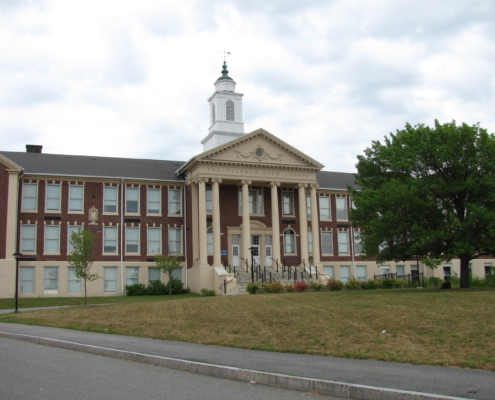
A Bird’s Eye View: Massachusetts K-12 Education by County
Massachusetts has had the best public school system in the country for the past two decades: along with some of the highest per pupil spending as well. Among the counties, does high per pupil spending translate to better results? The short answer: not really.
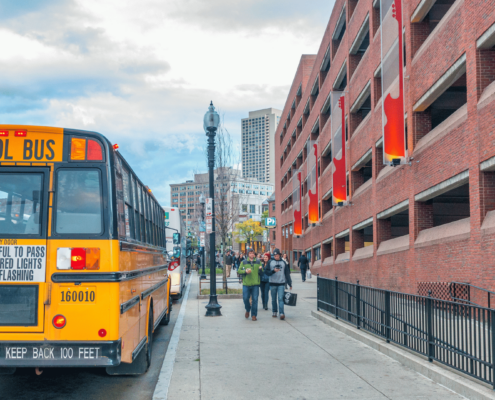
Study: Update Finds Boston Public Schools Making Slow, Uneven Progress
The Boston Public Schools (BPS) are experiencing some positive change but have a long way to go to streamline critical processes, improve school accountability, and create a realistic, school-centered budget, according to a new study from Pioneer Institute.
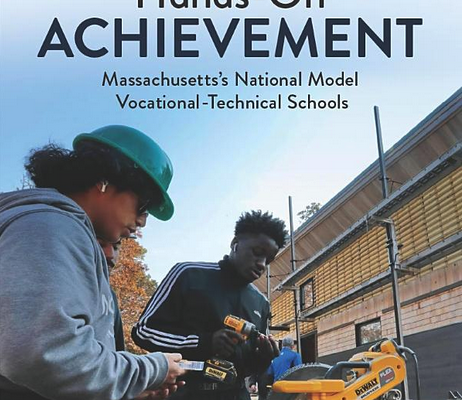
Webinar: Focusing on Massachusetts’ Model Vocational-Technical Schools
Pioneer Institute and First Things Magazine recently hosted an hour-long webinar examining the successes of vocational-technical schools, how education in the trades is faring nationwide, and the prospects for today’s high school graduates as they seek careers and additional training beyond the secondary level.
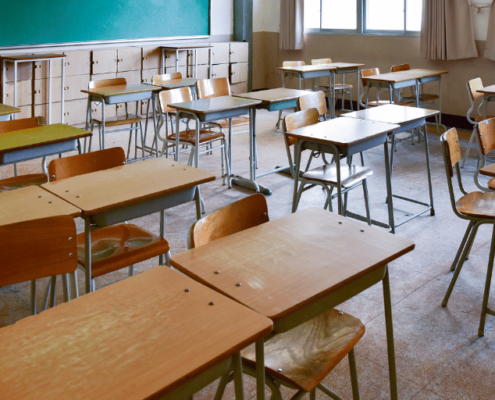
Study Finds COVID Led to Significant Declines in Massachusetts School Enrollments
After a decade of relative stability, COVID has wreaked havoc with Massachusetts public school enrollments, and the U.S. Department of Education projects more declines by 2030, according to a new study published by Pioneer Institute. The figures should serve as a warning to vulnerable districts that they must be prepared for the financial, staffing, and facilities impacts that may accompany substantial drops in public school enrollments.

Fmr. Mississippi Chief Dr. Carey Wright on State Leadership & NAEP Gains
This week on The Learning Curve, Dr. Carey Wright, former Mississippi state superintendent of education, discusses the dramatic improvements in fourth graders' reading scores in Mississippi during her time there, the importance of early childhood education and literacy programs, the role of literature and art, and the inspiration educators can draw from Mississippi's heroes in the Civil Rights Movement.

Prof. Lorraine Pangle on the Founders, Education, and Civics
This week on The Learning Curve, Lorraine Pangle, professor of political philosophy at the University of Texas at Austin, discusses how the Founding Fathers' grounding in classical and Enlightenment thought helped shape America's Constitution, the Bill of Rights, and the role of public education as a wellspring of republican self-government.

U.K.’s Robert McCrum on P.G. Wodehouse, ‘Jeeves & Wooster,’ and April Fools’ Day
In this special April Fools' Day edition of The Learning Curve, British writer and editor Robert McCrum, discusses English comic genius P.G. Wodehouse, his inimitable prose style, and much-needed humor he brought to 1920s and '30s Britain in the wake of World War I and the 1918 flu epidemic.

Ashley Soifer on Microschools, Pods, & Homeschooling
This week on The Learning Curve, Ashley Soifer, Chief Innovation Officer of the National Microschooling Center discusses these innovative schooling options, in which families and innovators are using a wide array of education choices that offer parents flexibility and greater control over how, where, what, and when their children learn.

UVA Prof. Dan Willingham on Learning Science & K-12 Schooling
This week on The Learning Curve, University of Virginia Professor Dan Willingham discusses the psychology of learning, his advocacy of using scientific knowledge in classroom teaching and education policy, and his critique of the “learning styles theory” of education.

UK Oxford’s Sir Jonathan Bate on Shakespeare’s ‘Julius Caesar’
This week on The Learning Curve, U.K. Oxford and ASU Shakespeare scholar Prof. Sir Jonathan Bate, discusses Shakespeare's timeless play Julius Caesar on the Ides of March. Sir Jonathan explains the Roman lessons for American constitutionalism, including warnings against the dangers of dictatorship and civil war.

Supreme Debt Consideration: Will Biden’s Student Debt Cancellation Get Passing Grade?
Joe Selvaggi talks with constitutional scholar Ilya Somin about the merits and likely success of the two Supreme Court cases Nebraska v. Biden and Department of Education v. Brown, which challenge the President’s constitutional right to cancel more than $400 billion in student debt.

“The Last Candid Man”: B.U.’s Dr. John Silber
This week on The Learning Curve, Cara and Gerard talk with Rachel Silber Devlin about her memoir, Snapshots of My Father, John Silber, which captures the wide-ranging and remarkable life of the late philosopher, teacher, and president of Boston University.

Room to Grow: Study Identifies Opportunity for New Charter Schools in State’s Gateway Cities
The Commonwealth’s 26 Gateway Cities represent a strong opportunity for the establishment of new charters and/or expansion of existing schools, according to our new study.

Why Massachusetts Should Be a Leader in Encouraging Education Entrepreneurship and Innovative K–12 Learning Models
This policy brief urges Massachusetts policymakers to encourage the proliferation and progress of non-traditional models that offer families creative, flexible, personalized and low-cost private education options.

Massachusetts Survey Report on US History MCAS
Sixty-two percent of Massachusetts residents support restoring passage of a U.S. history test as a public high school graduation requirement, according to a poll of Massachusetts residents’ attitudes toward education policy commissioned by Pioneer Institute and conducted by the Emerson College Polling Center.

A Tale of Two City Schools: Worcester Tech and Putnam Academy Become Models for Recovery
This report focuses highlights turnarounds at two Massachusetts schools, Worcester Technical High School and the Roger L. Putnam Vocational Technical Academy in Springfield, that were once known for high dropout rates and low graduation rates. The report shows that these schools now excel due to new leadership, community investment, and committed teachers. The report analyzes how Worcester Tech and Putnam Academy — schools with high numbers of low-income and special needs students — leapt from the bottom of Massachusetts voc-tech rankings to become leaders among local schools. The Pioneer paper includes interviews with administrators and presents several recommendations that could help transform struggling voc-tech schools.
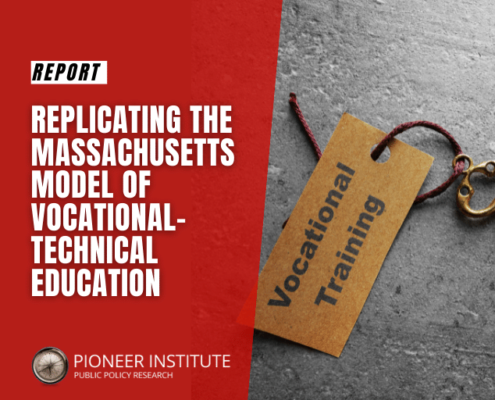
Replicating the Massachusetts Model of Vocational-Technical Education
This new report — “Replicating the Massachusetts Model of Vocational-Technical Education” — is a toolkit that can empower state leaders to transform their vocational-technical schools for the better. It builds on “Hands-On Achievement,” a book detailing the Massachusetts model that Pioneer published earlier this year.

METCO Funding: Understanding Massachusetts’ Voluntary School Desegregation Program
The Metropolitan Council for Educational Opportunity, or METCO program, has successfully educated thousands of students for 56 years, but several minor changes could make it even better, according to a new study published by Pioneer Institute.

Earning Full Credit: A Toolkit for Designing Tax-Credit Scholarship Policies (2022 Edition)
This report shows that education tax credits grew increasingly popular in 2021, with four more states enacting programs. There are now 28 tax-credit scholarship (TCS) programs in 23 states, and they serve more than 325,000 students.
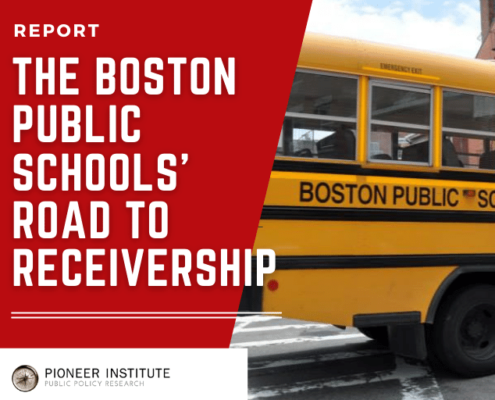
The Boston Public Schools’ Road to Receivership
This report summarizes the findings of MA DESE’s 2020 review of the Boston Public Schools, highlighting key findings around the teaching and learning, operational, financial, and enrollment challenges the state identified. It also describes why, according to the report, BPS persistently struggles in these areas and how its struggles negatively impact students. The paper describes several options the district and the state have for rectifying the problems and helping BPS meet its constitutional and moral obligations to the students and families it serves.
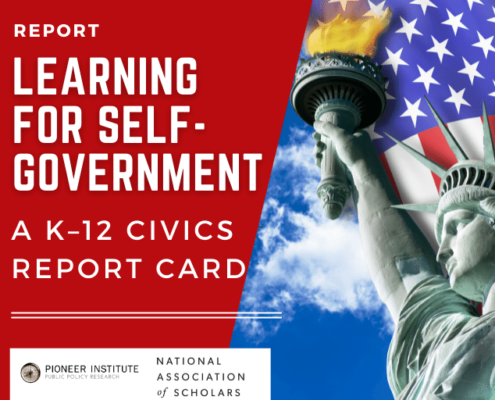
Learning for Self-Government: A K–12 Civics Report Card
This report, intended primarily for civics reformers considering how best to defend and improve traditional American civics education, surveys a selection of different civics offerings, both the traditional and the radical. Surveyed providers include organizations such as the Jonathan M. Tisch College of Civic Life, We the People, and Hillsdale College’s 1776 Curriculum. It also provides recommendations about how civics reformers should build upon this existing array of civics curriculum resources to work most effectively to reclaim America’s civics education.

Modeling an Education Savings Account for Massachusetts
This report finds that Massachusetts provides fewer options for students to be educated outside their assigned school districts than most other states do, and educational savings accounts (ESAs) offer an effective tool for giving students additional opportunities. Author Cara Candal proposes two potential ESA programs for Massachusetts.
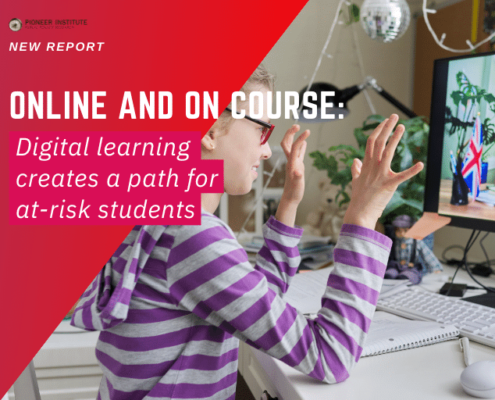
Online and On Course: Digital learning creates a path for at-risk students
Digital learning, the use of computers and the internet to study courses taught in the classroom, is viewed by many educators as a breakthrough to helping those at-risk students stay in school and earn their diplomas. The flexibility afforded by digital learning, with students working on their own time at their own pace, is a way for students to meet the requirements of their courses while handling pressing responsibilities outside of school, problems at home or personal issues. Yet parents should scrutinize digital programs closely. Their quality and effectiveness vary widely. Students are poorly served by point-and-click assessments with no engagement, virtual schools with videos instead of real teachers and programs without pacing and scheduling support.
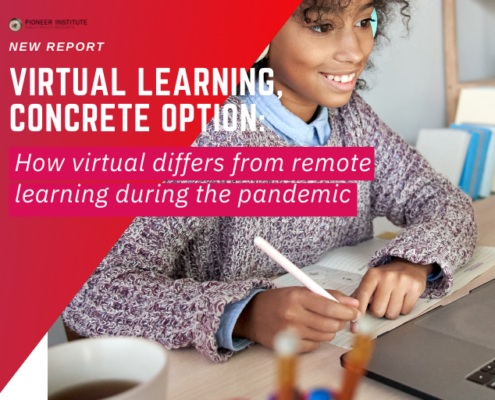
Virtual Learning, Concrete Option: How virtual differs from remote learning during the pandemic
After schools closed in March of 2020 due to the COVID-19 pandemic, students, families and teachers had to shift learning from in-class to online. But the switch to remote learning was hasty and disorganized in many school districts. Families struggled with the technology and coordinating schedules at home, while teachers tried to shift the in-person model to teaching through a computer. The dissatisfaction caused many families to believe that the remote learning they were experiencing was what takes place in full-time virtual schools. In fact the two are much different. This report includes information on how to distinguish between questionable and quality virtual programs.

Homeschooling in Uncertain Times: COVID Prompts a Surge
After steadily increasing for years, the number of parents choosing to homeschool their children skyrocketed during the pandemic, and policy makers should do more to acknowledge homeschooling as a viable option, according to a new study published by Pioneer Institute.

Public Opinion Survey of Massachusetts Residents’ Perceptions of K-12 Education During the Covid-19 Pandemic – March 2021
An Emerson College Poll a poll of 1,500 residents commissioned…

Bad IDEA: How States Block Federal Special Education Funding to Private and Religious School Students
This report finds that two states and three school districts around the country for which data are available appear to be out of compliance with provisions of the federal Individuals with Disabilities Education Act (IDEA) that require provision of equitable, publicly funded special education services to students in private schools, after a $3.8 million settlement was reached in Massachusetts for failure to comply.
